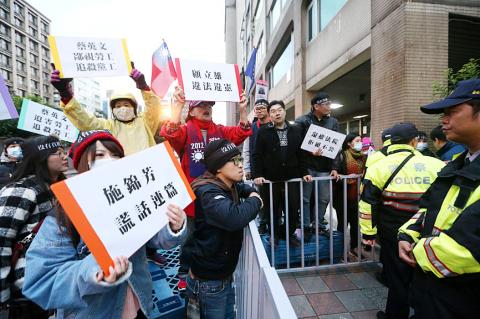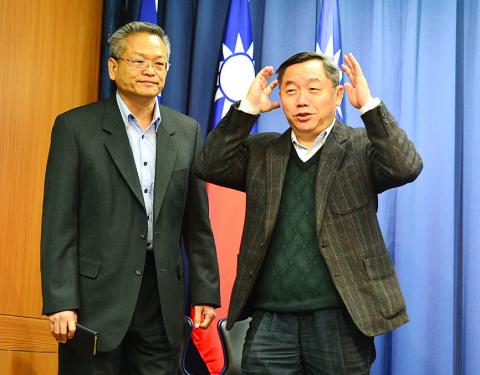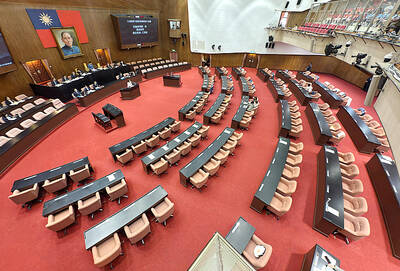The Taipei High Administrative Court yesterday ruled in favor of the Chinese Nationalist Party (KMT), suspending the transfer to the state of Central Investment Co (中央投資公司) and Hsinyutai (欣裕台) shares held by the party.
After the announcement, KMT officials claimed victory in their battle against the Cabinet’s Ill-gotten Party Assets Settlement Committee, which is headed by Wellington Koo (顧立雄).
The committee concluded that Central Investment and Hsinyutai are KMT-affiliated organizations and shares valued at about NT$15.6 billion (US$488 million) should be transfered to the state since the companies were founded using illegally obtained assets.

Photo: CNA
The committee had a letter of deposition sent to the KMT last month, giving the party 30 days to comply with the assets transfer. The party filed a court motion to block the request before a final verdict was handed down.
“The shares could be put up for open bidding or passed on to management by a third party,” said Hsu Jui-chu (許瑞助), the presiding judge and spokesman for the Taipei High Administrative Court. “However, if the KMT wins the case, then they would have lost money making the transfer. If the KMT were to be compensated for that loss, it would be a large amount to be settled.”
“If the companies were to be sold or transferred to a third party before a final verdict, then it would lead to complex legal problems, and could result in disputes, which would waste public resources. Therefore, the court has ruled to suspend the transfer of the company’s shares to the state,” Hsu said.

Photo: Wang Yi-sung, Taipei Times
Yesterday’s decision can be appealed.
In response to the ruling, Koo said it reaffirmed the committee’s conclusion that the KMT’s shares in the two investment firms were acquired using ill-gotten assets.
Quoting the court’s news release, Koo said that if the committee’s conclusion had been overturned, it would likely create a loophole whereby the two companies could divest themselves of their assets, which would defeat the purpose of the Act Governing the Handling of Ill-gotten Properties by Political Parties and Their Affiliate Organizations (政黨及其附隨組織不當取得財產處理條例), which is meant to ensure fair competition among political parties, thus improving the nation’s democratic system.

Photo: Huang Hsin-po, Taipei Times
“The KMT should stop benefiting from Central Investment and Hsinyutai. The ruling means that the KMT should neither transfer nor use the shares, effectively freezing them,” Koo said.
As to remarks by KMT Administration and Management Committee director Chiu Da-chan (邱大展) that Koo should stand down from his duties as committee chairman over the ruling, Koo said the media should ask Chiu whether the KMT would accept the court’s affirmation that the KMT shares were illegal assets as defined by the law.

The Chien Feng IV (勁蜂, Mighty Hornet) loitering munition is on track to enter flight tests next month in connection with potential adoption by Taiwanese and US armed forces, a government source said yesterday. The kamikaze drone, which boasts a range of 1,000km, debuted at the Taipei Aerospace and Defense Technology Exhibition in September, the official said on condition of anonymity. The Chungshan Institute of Science and Technology and US-based Kratos Defense jointly developed the platform by leveraging the engine and airframe of the latter’s MQM-178 Firejet target drone, they said. The uncrewed aerial vehicle is designed to utilize an artificial intelligence computer

The Chinese Nationalist Party (KMT) caucus yesterday decided to shelve proposed legislation that would give elected officials full control over their stipends, saying it would wait for a consensus to be reached before acting. KMT Legislator Chen Yu-jen (陳玉珍) last week proposed amendments to the Organic Act of the Legislative Yuan (立法院組織法) and the Regulations on Allowances for Elected Representatives and Subsidies for Village Chiefs (地方民意代表費用支給及村里長事務補助費補助條例), which would give legislators and councilors the freedom to use their allowances without providing invoices for reimbursement. The proposal immediately drew criticism, amid reports that several legislators face possible charges of embezzling fees intended to pay

REQUIREMENTS: The US defense secretary must submit a Taiwan security assistance road map and an appraisal of Washington’s ability to respond to Indo-Pacific conflict The US Congress has released a new draft of the National Defense Authorization Act (NDAA), which includes up to US$1 billion in funding for Taiwan-related security cooperation next year. The version published on Sunday by US House of Representatives Speaker Mike Johnson removed earlier language that would have invited Taiwan to participate in the US-led Rim of the Pacific Exercise (RIMPAC). A statement on Johnson’s Web page said the NDAA “enhances U.S. defense initiatives in the Indo-Pacific to bolster Taiwan’s defense and support Indo-Pacific allies.” The bill would require the US secretary of defense to “enable fielding of uncrewed and anti-uncrewed systems capabilities”

Renewed border fighting between Thailand and Cambodia showed no signs of abating yesterday, leaving hundreds of thousands of displaced people in both countries living in strained conditions as more flooded into temporary shelters. Reporters on the Thai side of the border heard sounds of outgoing, indirect fire yesterday. About 400,000 people have been evacuated from affected areas in Thailand and about 700 schools closed while fighting was ongoing in four border provinces, said Thai Rear Admiral Surasant Kongsiri, a spokesman for the military. Cambodia evacuated more than 127,000 villagers and closed hundreds of schools, the Thai Ministry of Defense said. Thailand’s military announced that